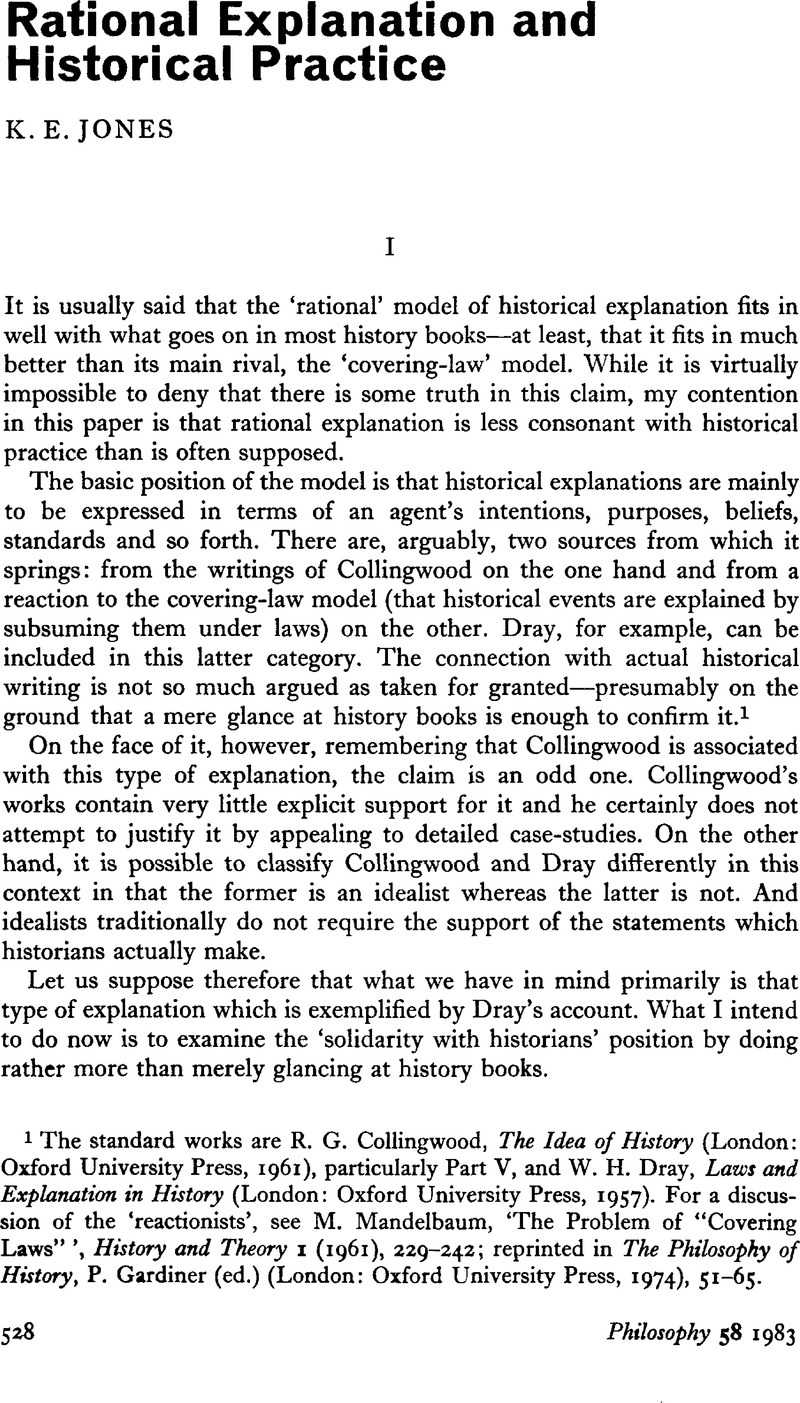No CrossRef data available.
Article contents
Rational Explanation and Historical Practice
Published online by Cambridge University Press: 30 January 2009
Abstract

- Type
- Discussion
- Information
- Copyright
- Copyright © The Royal Institute of Philosophy 1983
References
1 The standard works are R. G. Collingwood, The Idea of History (London: Oxford University Press, 1961), particularly Part V, and W. H. Dray, Laws and Explanation in History (London: Oxford University Press, 1957). For a discussion of the ‘reactionists’, see M. Mandelbaum, ‘The Problem of “Covering Laws” ’, History and Theory 1 (1961), 229–242; reprinted in The Philosophy of History, P. Gardiner (ed.) (London: Oxford University Press, 1974), 51–65.
2 A detailed account occurs in R. Binion, ‘Repeat Performance: A Psychohistorical Study of Leopold III and Belgian Neutrality’, History and Theory 8 (1969), 213–259. An example of a more general account occurs in Alistair Home, To Lose a Battle (Harmondsworth: Penguin Books, 1979), 72.
3 A. J. P. Taylor, English History 1914–1945 (Harmondsworth: Penguin Books, 1970), 571–572.
4 John Watkins, ‘Imperfect Rationality’, Explanation in the Behavioural Sciences, R. Borger and F. Cioffi (eds) (London: Cambridge University Press, 1970), 211.
5 James Joll, ‘1914: The Unspoken Assumptions’, The Origins of the First World War, H. W. Koch (ed.) (London: Macmillan, 1972), 307–328.
6 Cf. Robert Skidelsky, ‘Lessons of Suez’, The Age of Affluence 1951–1964, V. Bogdanor and R. Skidelsky (eds) (London: Macmillan, 1970), 168–191.
7 K. Zilliacus, Mirror of the Past (New York: A. A. Wyn, Inc., 1946), 136–149. Reproduced in The Outbreak of the First World War, Dwight E. Lee (ed.) (Boston: D. C. Heath and Company, 1963), 45–51. The quotation is on p. 45, my italics.
8 Robert Blake, The Unknown Prime Minister (London: Eyre & Spottiswoode, 1955). 285.
9 Cf. A. J. P. Taylor, The Struggle for Mastery in Europe 1848–1918 (London: Oxford University Press, 1971), 211, 217–218.
10 Alfred Cobban, A History of Modern France, Volume 2: 1799–1945 (Harmondsworth: Penguin Books, 1961), 196.
11 R. F. Atkinson, Knowledge and Explanation in History (London: Macmillan, 1978), 139, my italics.
12 Cf. op. cit. note 3, 526–527.
13 Barbara W. Tuchman, The Proud Tower (London: H. Hamilton, 1966),xiv.
14 Cf., for example, ‘It was now [1940] that France needed a Gambetta or a Clemenceau and failed to find one’. J. P. T. Bury, France 1814–1940 (London: Methuen & Co. Ltd, 1969), 294.
15 As reported in Winston S. Churchill, The Second World War, Volume 3 (London: Cassell, 1964), 137–138. In 1918, there were sixty British divisions in the line.
16 K. R. Popper, The Open Society and its Enemies, Volume 2 (London: Routledge & Kegan Paul, 1966), 251, my italics.


